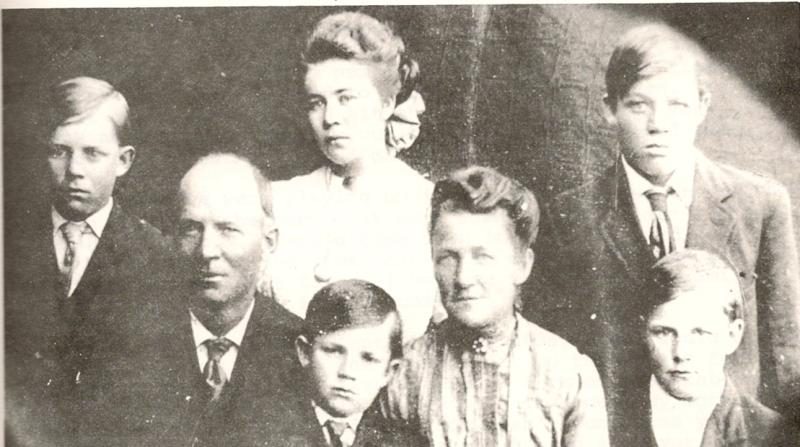Wilford Richard Tolman Sr.
Wilford Richard Tolman Sr. was born at Fountain Green, Utah December 12, 1864. He was the fourth son of Cyrus Hewett Tolman and Margaret Eliza Utley. The family, his parents and older brothers, had been living at Tooele, Tooele County, Utah but on account of Indian trouble they moved to Fountain Green where Wilford was born.
He was not a healthy child, being troubled with indigestion and kidney trouble. His mother feared that she would not be able to raise him to manhood, but he gradually grew better and for many years he enjoyed very good health. When he was yet a small boy the family moved to Knolen, Tooele County, Utah, at which place they made their home for several years. For various reasons Wilford received very little schooling during his early years but later he took correspondence courses and did a great deal of reading, so that during his life he was really very well informed. It was at Knolen that he met and married Laura Rowena McFate. Eight children were borbnn to this union.
His Accomplishments
When he was about ten years old, being musically inclined, he had the opportunity to take violin lessons, and at the age of twelve he was playing for the local dances and in whatever community he lived he always played for dances. He was especially adept when it came to playing for the square dances, later he belonged to orchestras.
He, his wife, and two small children moved to Fairview, Wyoming in the Star Valley, in 1892. At this place he did some farming, and stock raising. While in Fairview he took a course in taxidermy after which he did a great deal of mounting of animals. He mounted several whole elk, which he sold to the Elk’s Lodges in different cities in the eastern United States. In 1903 he took some of his specimens of taxidermy to St. Louis, Mo. To the World’s Fair, where he exhibited them and also sold some for a very good price.
Momentous Journey
In 1910 he moved his family (with the exception of Wilford Richard Jr. who was on a mission at that time) to Otto, Big Horn County, Wyoming, a distance of 500 miles. The trip was made in wagons trailing a band of sheep. When several days out on the trail his only living daughter was accidently shot with a .22 rifle, the bullet going through her hand and leg. As they were a long way from a town or doctor, Wilford cared for the wounds himself.
He had never taken interest in religion, but believed firmly in the power of prayer. At this time he and his wife would retire to some secluded spot and pray for his daughter’s recovery. Their prayers were answered, for the wounds healed in a very short time. Just about a week after this first accident one of the men who was helping trail the sheep was accidently shot and killed. At the time this tragedy happened, they were camped high on the Continental divide, as a range of mountains had to be crossed in traveling from Southern Wyoming to Northern Wyoming.
It was November and Wilford was anxious to get to a lower altitude with his family, and also with the sheep, but had to wait until a coroner arrived from Lander before moving on. They had to wait five days. Of course the family was in a state of mind, being stranded in such a place with a corpse, and expecting snow any time but Wilford would gather them into one of the sheep wagons and entertain them with funny stories or would play the violin, and succeeded in diverting their minds to a certain extent. They were finally able to go on, and the next day they arrived at a small town and Wilford knew that he was going to have to ask a stranger to cash a check, as he was getting short of cash. He entered a general store and accosted the proprietor, making his wishes known. The proprietor said, “Are you a Mormon?” Wilford answered “Yes, I’m a Mormon,” fully expecting a refusal, but the proprietor said, “you can have anything in the store. I’ve dealt with your people before and have always found them to be honest.” It only took the party a few more days to reach their destination, the trip having taken six weeks. Now we make the trip by car in one day. The distance could have been covered in a week at that time with a team and light wagon, without the sheep.
His Wit
Wilford possessed a keen sense of humor. I am reminded of one instance in his middle age. Governor Kendrick of Wyoming had given a speech in the town of Basin, Wyoming, one evening and the next morning he was in the barber shop, in the chair with his face covered. At this particular time Wilford entered the shop so the barber, thinking he would have some fun, said, “Well, Bill, what did you think of the governor’s speech?” So Wilford began picking to pieces the speech, and the manner in which it was delivered. Then the barber took the towel off the Governor’s face and introduced them. The Governor said, “I never expected to hear so much truth about myself, but I’m delighted to meet you, Mr. Tolman.”
He continued raising stock in the Big Horn Basin until the time of his death of heart failure, November 5, 1929. He was buried November 7, 1929. He had sent two sons on missions and his youngest son is on a mission at this time (1950).
Visit FamilySearch to learn more about Wilford Richard Tolman. Also visit the Thomas Tolman Family Organization to find out how you can get more involved in family history.


